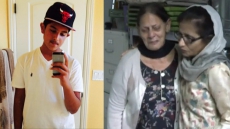It was just a few seconds, a video clip of several young women laughing and clapping to music, dressed for a party or a wedding in orange headscarves and robes with floral patterns. Then a few more seconds of a young man dancing alone, apparently in the same room.
The cellphone video was made six years ago, in a village deep in Kohistan, a rugged area of northwest Pakistan. It was the last time the young women, known only as Bazeegha, Sareen Jan, Begum Jan, Amina and Shaheen, have ever been definitively seen alive.
What happened to them remains a mystery. Their fates have been shrouded by cultural taboos, official inertia, implacable resistance from elders and religious leaders suspected of ordering their deaths, and elaborate subterfuges by the families who reportedly carried out those orders.
Even in Pakistan, where hundreds of “honor killings” are reported every year, this case was extreme. According to court filings and interviews with people who investigated it, the families confined the girls for weeks, threw boiling water and hot coals on them, then killed them and buried them somewhere in the Kohistan hills.
Later, when investigators appeared, relatives and community leaders insisted that the girls were still alive and produced a second set of similar-looking girls to prove it. They even disfigured one girl’s thumbprints so she couldn’t be checked against the identity of the victim she was supposed to impersonate.
The story illustrates many of the reasons Pakistani officials have failed to curb the problem of honor killings. These include the cruel sway of traditional tribal councils, known as jirgas, over uneducated villagers; the lengths to which such leaders may go to defy state authority; and the casual worthlessness they assign to the rights, lives and even identities of young women.
“This has destroyed my family. The girls are dead, my brothers have been killed and nothing has been done to bring justice or protect us,” said Kohistani, 26, who has received death threats. “I know I will probably be killed, too, but it doesn’t matter,” he said in an interview last week. “What happened is wrong, and it has to change.”
Renewed judicial interest in these long-ago events coincided with another encouraging development: the passage of a new law in parliament that strengthened judicial powers in honor-killing cases. Often, even when such crimes manage to reach the courts, there is no punishment because the law allows victims’ families to “forgive” the perpetrators — who are often their own relatives.
The new law, passed in October, gives judges more ammunition to impose life prison sentences for honor killings in extreme circumstances, allowing them to overrule personal deals by making the murder a crime against the state. But supporters fear that cultural and political resistance will continue to prevent justice being done.
“We don’t know yet whether the law will make much difference. Punishment is still not mandatory, and forgiveness can still negate justice,” said Benazir Jatoi, a lawyer who works on women’s rights. “Until there is more political will, I don’t think the lives of ordinary women threatened with honor violence will change.”
The Kohistan case unfolded in a conservative rural region where social mingling between genders was taboo. The the girls’ participation in a coed singing party was risky enough, but someone posted the video on the Internet, where it spread rapidly, bringing shame on their community before the vast virtual world.
The head of the local jirga, a Muslim cleric, allegedly issued a religious decree ordering the five girls to be killed for dishonoring their tribe, along with the boy seen dancing and every member of his family. There was no resistance from the community. After the girls were disposed of, several brothers of the boy were also caught and killed. The rest of the family, including Kohistani, fled the area.
Finally, last month, Kohistani’s crusade got an unexpected break when the Supreme Court, under a new chief justice, agreed to accept his petition. Once more, a fact-finding mission was sent to the village. This time, it included a district judge and two police officers, armed with government ID records with the heights and thumbprints of the missing girls.
What they encountered was hair-raising.
In his report afterwards, Kohistan Judge Shoaib Khan said the village elders were “unanimous” in insisting that the girls were alive. But two of the girls they produced were much younger than the victims, according to their official birth dates. A third could not be identified because both thumbs had been burned; her parents insisted that it was from a cooking accident. He concluded that at least two girls did not match the ones in the video and that the others were probably also imposters.
“All this leads to the suspicious conclusion that something is wrong at bottom,” Khan wrote. The case, he advised, “needs exhaustive inquiry.”
One day last week, Kohistani, wearing a conservative suit and carrying a copy of the judge’s report, walked up to the Supreme Court. He smiled slightly as he shook hands with his attorney, and they went inside to wait for the next hearing.




